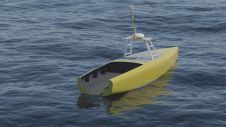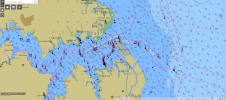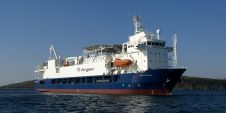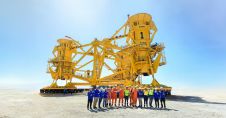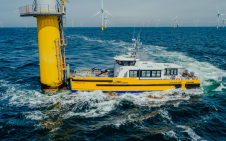Dynamism - The Password
Opens the way to evolution
IMCA, the international association representing the interests of offshore, marine and underwater engineering companies, has over 350 member companies in more than forty countries. Its four technical divisions cover marine/specialist vessel operations, offshore diving, remote systems and ROVs and, of particular interest to Hydro International readers, offshore survey.
One of the major strengths of IMCA is its dynamism. It is constantly evolving and developing to suit the needs of its membership. That is why in 1997 the youngest IMCA division, the Offshore Survey Division, was formed to complete the ‘IMCA technical jigsaw’. This division now has over seventy member companies all over the world; not surprising, for offshore survey is fundamental to our members’ work, surveyors being tasked with positioning, inspection or route planning on all vessels engaged in marine contracting activities.
Proactive
As a highly proactive global trade association IMCA seeks to promote its members’ common interests, to resolve industry-wide issues and to provide an authoritative voice. In add–ition to our four technical divisions we also have geographical sections for the Americas Deepwater, Asia-Pacific, Europe & Africa and the Middle East & India regions, as well as a core focus on safety, the environment, competence and training. The Offshore Survey Division is active in developing work programmes focusing on members’ international activities and it plays an active role in our Annual Marine Seminar. This year’s event will be held in Paris from 6th to 7th November 2007 with the theme ‘New Frontiers in Marine Contracting’.
Growth
IMCA has grown dramatically over the past few years, the number of member companies and their base countries increasing by about 15% per year. Knut Boe, of Technip, newly elected IMCA president is encour–aging the evolution and influence of IMCA as membership increases and the international work of members spreads both into new countries and with new technologies. Offshore survey work is at the core of many activities and there is considerable synergy between the Offshore Survey Division and the Marine and ROV Divisions, not least because so many vessels are dynamically positioned (DP) and, of course, much survey work is done by ROVs.
Scope
The Offshore Survey Division is concerned with all aspects of equipment, operations and personnel relating to offshore survey. In a nutshell, key areas of recent work include competence standards for safety-critical personnel involved in the offshore survey industry, the development of technical guidelines aimed at enhancing the efficiency of operations across the sector, and a concerted effort to raise the profile of this division within the industry.
Technical Guidelines
Each year the IMCA offshore survey divisional management committee sets out a programme of specific projects and objectives. It’s publications over recent years include Inter-vessel survey data standard telemetry protocol, Guidelines for the use of multi-beam echo sounders for offshore surveys (revised January 2006), Marine inspection checklist for small workboats, Digital video offshore: A review of current and future technologies (published in September 2005 and already being updated in association with the ROV Division) and The shared use of DGPS for DP and survey operations.
The division is currently working on guidance for installation and maintenance of GNSS-based reference systems, the development of guidelines on sharing of other vessel sensors, and deepwater acoustics. It is also reviewing and revising Competence assurance and assessment: Offshore Survey Division. The other three technical divisions have similarly packed work programmes; all designed to ensure ever more efficient and safe international operations.
Standard Contracts
To help members, especially in this division where a survey member may often be working for an IMCA member of another division, we have published some standard contract principles aimed at facilitating fair agreement and fitting in with other IMCA initiatives on contracts.
Challenges Ahead
As the industry moves into remoter areas and deeper water it becomes increasingly important for the surveyor to know accurately the precise position of a piece of work. As this becomes more crucial it also poses a more and more difficult challenge.
At the same time a serious skills shortage is hitting the market. The industry is extremely busy and expected to remain so for a number of years. Companies are experiencing significant challenges in recruiting sufficient trained and skill–ed personnel for projects internationally. This places significant pressure on the desire for growth and ability to deliver services.
Working with members, we recently published some practical estimates of the possible growth of their businesses. For example, orders for new-build construction vessels, drilling rigs, saturation diving spreads and remotely operated vehicles (ROVs) helped us to provide statistics giving an indication of the pressing need for recruitment in the industry:
- the industry will commission at least fifty new offshore construction vessels in the next two to three years, covering IMCA member activities including lifting, pipe-lay, diving, survey and ROV operations; about ten of these will be dive support vessels (DSVs)
- the drilling industry will commission about forty more floating drilling rigs (semi-submersible of ship shape) in the next three years
- around a hundred new ROVs will be built, most Work Class
- the new vessels will require around a thousand additional survey and inspection discipline personnel
- the ROV spreads will require some 1,200 additional personnel to operate them.
Recruitment
Offshore surveyors are much needed at all levels and we are eager to help members address the shortage. Visitors to the IMCA website (webreferences 1) will find a whole section devoted to career and employment opportunities in the offshore surveying industry, as well as other offshore contracting sectors, including entry and training requirements. Information sheets devoted to careers in offshore surveying include a graphical guide to hydrographic survey operations, and a series of leaflets devoted to becoming an offshore surveyor, data processor, engineer/technician, or geophysicist. We want to encourage those looking for career opportunities at all levels to look at the information on our website and then link to the websites of members seeking to recruit.
There is an important role for offshore surveyors in global marine contracting and we are proud to represent their interests.

Value staying current with hydrography?
Stay on the map with our expertly curated newsletters.
We provide educational insights, industry updates, and inspiring stories from the world of hydrography to help you learn, grow, and navigate your field with confidence. Don't miss out - subscribe today and ensure you're always informed, educated, and inspired by the latest in hydrographic technology and research.
Choose your newsletter(s)













